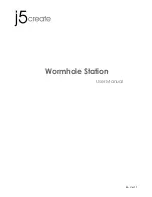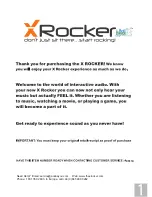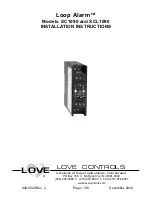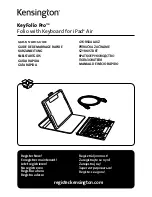
Installation Instructions
SYSAUxP2
5
Isolated Ground Receptacle
This product incorporates an isolated ground receptacle,
identified by the orange triangle on its face. This feature may be
useful to reduce common noise in the connected equipment. Its
intended use is to reduce electrical noise (electromagnetic
interference) by purposely insulating the grounding circuit from
any metallic wiring system. The ground pin of the receptacle is
connected to the green/yellow wire and is isolated from the
metal mounting yoke of the receptacle. The accessible metal of
the product is connected to the green wire. If it is not desired to
use this feature, connect the green/yellow and green wires
together.
References
Application Guide for Isolated Ground Wiring Devices 2007,
National Electrical Manufacturers Association (NEMA)
IEEE Std 1100
™
-2005, “IEEE Recommended Practice for
Powering and Grounding Electronic Equipment” (Emerald
Book), Section 8.5.3.2.
IEEE Std 142™-2007, “IEEE Recommended Practice for
Grounding of Industrial and Commercial Power Systems”
(Green Book), Sections 5.5.1, 5.5.2
NFPA-70, “National Electrical Code”, Article 250.146
Connecting Receptacle Grounding Terminal to Box.
•
(D) Isolated Ground Receptacles. Where installed
for the reduction of electrical noise (electromagnetic
interference) on the grounding circuit, a receptacle
in which the grounding terminal is purposefully
insulated from the receptacle mounting means shall
be permitted. The receptacle grounding terminal
shall be connected to an insulated equipment
grounding conductor run with the circuit conductors.
This equipment grounding conductor shall be
permitted to pass through one or more panel boards
without a connection to the panel board grounding
terminal bar as permitted in 408.40, Exception, so
as to terminate within the same building or structure
directly at an equipment grounding conductor
terminal of the applicable derived system or service.
Where installed in accordance with the provisions of
this section, this equipment grounding conductor
shall also be permitted to pass through boxes, wire
ways, or other enclosures without being connected
to such enclosures.
•
Informational Note: Use of an isolated equipment
grounding conductor does not relieve the
requirement for grounding the raceway system and
outlet box.
C22.2 No. 1, “Canadian Electrical Code, Part 1”, Rule 10-906
Bonding conductor connection to circuits and equipment.
•
(6) A bonding jumper shall be installed to connect
the bonding conductor to the grounding terminal of
a receptacle and in such a manner that
disconnection or removal of the receptacle will not
interfere with, or interrupt grounding continuity.
•
(7) In the case of metallically enclosed systems
where the grounding path is provided by the metal
enclosure, a bonding jumper shall be installed to
bond the grounding terminal of the receptacle to the
enclosure.
•
(8) Notwithstanding Sub-rules (6) and (7), the
bonding jumper, in the case of receptacles having
grounding terminals isolated from the mounting
strap required for special equipment, shall be
permitted to be extended directly back to the
distribution panel.
WARNING:
IMPROPER INSTALLATION CAN RESULT IN
DEATH OR SERIOUS PERSONAL INJURY! This mounting
system should be installed by qualified personnel.
IMPORTANT ! :
In addition to the SYSAU installation
instructions accompanying the products, the following
steps must also be taken when installing the
SYSAUxP2.
NOTE:
The SYSAUxP2 must be connected to a 15 Amp
branch circuit.
NOTE:
In some installations, the electrical install may be
facilitated by loosening the wing nut and removing the
entire outlet plate from the SYSAUxP2. (See Figure 1)
Figure 1
IMPORTANT ! :
There are two different methods of
SYSAUxP2 installation:
•
If installing the SYSAUxP2 in the
flush mode
,
proceed to
Installing in Flush Mode
section.
•
If installing the SYSAUxP2 in the
above-tile mode
,
proceed to
Installing in Above-Tile Mode
section.
Installing in Flush Mode
1.
Loosen, but do not remove, two Phillips head screws
holding outlet box to outer housing. (See Figure 2)
2.
Rotate outlet box counter-clockwise until it is free to be
removed from housing. (See Figure 2)
3.
Remove outlet box from housing. (See Figure 2)
Figure 2
(top view)
Outlet plate
1
x 2
2
3
outlet box
(view from below)






























